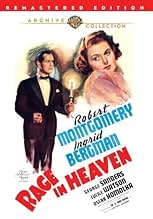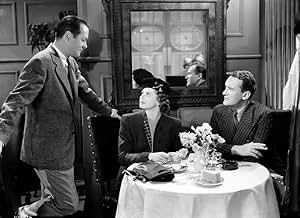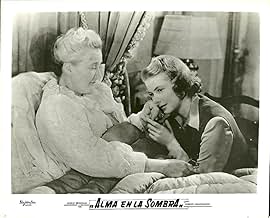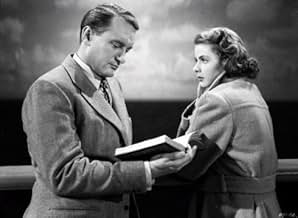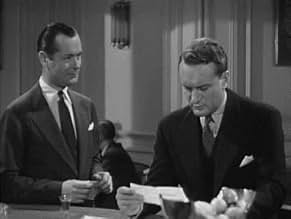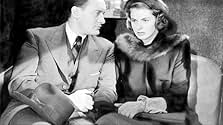IMDb RATING
6.4/10
1.4K
YOUR RATING
Robert Montgomery and George Sanders team up to play against type in this probing psychological thriller that features Ingrid Bergman as the object of their obsessions.Robert Montgomery and George Sanders team up to play against type in this probing psychological thriller that features Ingrid Bergman as the object of their obsessions.Robert Montgomery and George Sanders team up to play against type in this probing psychological thriller that features Ingrid Bergman as the object of their obsessions.
- Awards
- 3 wins total
Frederick Worlock
- Solicitor-General
- (as Frederic Worlock)
Ludwig Hardt
- Durand
- (as Ludwig Hart)
Stuart Hall
- Traveling Salesman
- (scenes deleted)
Major McBride
- Bank Clerk
- (scenes deleted)
Clive Morgan
- Traveling Salesman
- (scenes deleted)
Joseph North
- Undertaker
- (scenes deleted)
Wyndham Standing
- Dr. McTernan
- (scenes deleted)
Harry Allen
- Jury Foreman
- (uncredited)
Featured reviews
I guess I'll be the resident moron of this film's comment section. I liked Rage in Heaven. It was entertaining, interesting, and involving.
I realize Robert Montgomery phoned in his role. His complete detachment makes the character evil rather than sick, and one cannot feel sympathy for him, if we were ever supposed to. The biggest problem is that his flat line readings and cool demeanor make it unbelievable that Bergman married a man so completely lacking in self-esteem, charm, and ardor.
The very young, pre-superstar Ingrid Bergman is marvelous - very fresh and vibrant in the beginning, her personality becoming more somber after a short time being married to Montgomery. And who can blame her. George Sanders is excellent, his portrayal possessing all the charm and passion Montgomery lacks.
As far as this plot being contrived, perhaps, but it was also clever. The original ending of "Fatal Attraction" was based on the same idea. Seen in today's modern perspective "Rage in Heaven" is most interesting. The obsession that Phillip had for Wade - very bizarre indeed!
I realize Robert Montgomery phoned in his role. His complete detachment makes the character evil rather than sick, and one cannot feel sympathy for him, if we were ever supposed to. The biggest problem is that his flat line readings and cool demeanor make it unbelievable that Bergman married a man so completely lacking in self-esteem, charm, and ardor.
The very young, pre-superstar Ingrid Bergman is marvelous - very fresh and vibrant in the beginning, her personality becoming more somber after a short time being married to Montgomery. And who can blame her. George Sanders is excellent, his portrayal possessing all the charm and passion Montgomery lacks.
As far as this plot being contrived, perhaps, but it was also clever. The original ending of "Fatal Attraction" was based on the same idea. Seen in today's modern perspective "Rage in Heaven" is most interesting. The obsession that Phillip had for Wade - very bizarre indeed!
This psychological thriller involved a leading man who was brooding over his perceived mistreatment by MGM (Robert Montgomery), and a director, Woody Van Dyke, who was having a difficult physical and emotional time of it to the point that two other directors had to get involved. And yet it worked overall, although I feel it could have pulled together better than it did with a more cohesive vision.
Montgomery had said he was not going to act in this one, just read his lines. Yet his detached demeanor actually works as he is portraying Phillip Monrell, a man whose paranoia comes out of nowhere. He is the charming Robert Montgomery character of the high society comedies for the first 30 minutes of the film. And then becomes - without explanation - very paranoid. He has been overseas, only to return to England, meet, and marry his ailing mother's paid companion, Stella Bergen (Ingrid Bergman), in a whirlwind courtship. Ingrid you have to stop marrying in haste! You got lucky with Victor Lazslo in "Casablanca", but not this time!
And Monrell is most of all jealous of his long time "friend", engineer Ward Andrews (George Sanders). He begins to think his wife and Ward are having an affair. And this seems laughable as Sanders is for once portraying somebody who is admirable and completely guileless. Or is he??
There is a mystery patient at an insane asylum who escapes at the beginning of the film. You never see his face. And this never comes up until the end when a doctor there, Oscar Homolka, shows up at a crucial juncture. He is a very welcomed presence as he assaults a shopkeeper with his umbrella so an important phone call can be made.
Definitely worth watching. But there is just an odd lack of chemistry between the leads.
Montgomery had said he was not going to act in this one, just read his lines. Yet his detached demeanor actually works as he is portraying Phillip Monrell, a man whose paranoia comes out of nowhere. He is the charming Robert Montgomery character of the high society comedies for the first 30 minutes of the film. And then becomes - without explanation - very paranoid. He has been overseas, only to return to England, meet, and marry his ailing mother's paid companion, Stella Bergen (Ingrid Bergman), in a whirlwind courtship. Ingrid you have to stop marrying in haste! You got lucky with Victor Lazslo in "Casablanca", but not this time!
And Monrell is most of all jealous of his long time "friend", engineer Ward Andrews (George Sanders). He begins to think his wife and Ward are having an affair. And this seems laughable as Sanders is for once portraying somebody who is admirable and completely guileless. Or is he??
There is a mystery patient at an insane asylum who escapes at the beginning of the film. You never see his face. And this never comes up until the end when a doctor there, Oscar Homolka, shows up at a crucial juncture. He is a very welcomed presence as he assaults a shopkeeper with his umbrella so an important phone call can be made.
Definitely worth watching. But there is just an odd lack of chemistry between the leads.
James Hilton was not a great novelist, but he was a popular one in the 1930s and 1940s, and two of his books have managed to become minor classics. Both also were the basis of popular films: LOST HORIZON and GOODBYE MR. CHIPS. But, oddly enough, they were not the only Hilton novels that made it to the screen, nor the only two that became classic films. RANDOM HARVEST can be added to his novels that became film classics. And he also wrote his "Crippen" novel, WE ARE NOT ALONE (which starred Paul Muni and Dame Flora Robson), and this film, RAGE IN HEAVEN. In story it actually resembles RANDOM HARVEST a bit: In that film Ronald Colman is an amnesiac from World War I who escapes from an asylum, and eventually turns out to be the head of a large industrial empire. In RAGE IN HEAVEN Robert Montgomery is a paranoid who flees an asylum in France, and turns out to be the head of a large industrial empire. But Colman's character is intelligent and fair minded - a good boss. Montgomery is argumentative, harsh, and (ultimately) incompetent and cowardly. One can say that RAGE IN HEAVEN is the dark side of RANDOM HARVEST.
Robert Montgomery's film career is one of the most aggravating in Hollywood history. He built up a career in the 1930s playing cads and bounders in MGM comedies, with an occasionally good comic hero role (THE LAST OF MRS. CHEYNEY and TROUBLE FOR TWO come to mind). Then he got the plum role of the psychopathic Danny in NIGHT MUST FALL, and an Oscar nomination for best actor in 1937. But he did not get the Oscar (Spencer Tracy did). I have always suspected that had Montgomery won the Oscar he deserved to his name would be properly remembered today, as more than just a good actor who was the father of television's "Samantha", Elizabeth Montgomery. Instead, while he still had some good parts later in his career (many as a director and producer, as well as actor), he never got the recognition he thoroughly deserved.
It is obvious that RAGE IN HEAVEN was meant to be a follow-up "psycho" role for Montgomery, following Danny. But Phillip Morell is not as well done as Danny, probably because NIGHT MUST FALL was a play by Emlyn Williams originally, and so it was easier to transfer it to the screen than Hilton's novel. But then, LOST HORIZON, MR. CHIPS, and RANDOM HARVEST were well done screenplays too. Danny (for all his murderous habits) has his human moments, but Phillip doesn't. Phillip is always under-spoken and wide eyed. He always is on the verge of exploding (and similarly of collapsing - witness the moment the Union leadership force their way into his office to confront him over his unwillingness to settle the labor impasse, and how he just collapses and runs out yelling, "Give them whatever they want!"). A modern treatment might develop his mania somewhat. It is obvious that Hilton understood what paranoids were capable of - the business about the hidden confession in the diary rings true - but it is still not developed enough for the audience to understand. We know that Phillip's father was insane (and committed suicide) but more details are needed.
It was Ingrid Bergman's third or fourth American film. She was slowly inching her way to real stardom (she had touched it opposite Leslie Howard in the Hollywood version of INTERMEZZO), but her performance, while natural, is not very memorable. George Sanders again demonstrates his dependability in any role, here as a good guy almost destroyed by his mad friend. Oscar Homolka does a good job as the asylum head, whose assistance to Bergman saves Sanders in the end. It is not as good a film as it should have been with a better laid out script, but it is watchable one or two times.
Robert Montgomery's film career is one of the most aggravating in Hollywood history. He built up a career in the 1930s playing cads and bounders in MGM comedies, with an occasionally good comic hero role (THE LAST OF MRS. CHEYNEY and TROUBLE FOR TWO come to mind). Then he got the plum role of the psychopathic Danny in NIGHT MUST FALL, and an Oscar nomination for best actor in 1937. But he did not get the Oscar (Spencer Tracy did). I have always suspected that had Montgomery won the Oscar he deserved to his name would be properly remembered today, as more than just a good actor who was the father of television's "Samantha", Elizabeth Montgomery. Instead, while he still had some good parts later in his career (many as a director and producer, as well as actor), he never got the recognition he thoroughly deserved.
It is obvious that RAGE IN HEAVEN was meant to be a follow-up "psycho" role for Montgomery, following Danny. But Phillip Morell is not as well done as Danny, probably because NIGHT MUST FALL was a play by Emlyn Williams originally, and so it was easier to transfer it to the screen than Hilton's novel. But then, LOST HORIZON, MR. CHIPS, and RANDOM HARVEST were well done screenplays too. Danny (for all his murderous habits) has his human moments, but Phillip doesn't. Phillip is always under-spoken and wide eyed. He always is on the verge of exploding (and similarly of collapsing - witness the moment the Union leadership force their way into his office to confront him over his unwillingness to settle the labor impasse, and how he just collapses and runs out yelling, "Give them whatever they want!"). A modern treatment might develop his mania somewhat. It is obvious that Hilton understood what paranoids were capable of - the business about the hidden confession in the diary rings true - but it is still not developed enough for the audience to understand. We know that Phillip's father was insane (and committed suicide) but more details are needed.
It was Ingrid Bergman's third or fourth American film. She was slowly inching her way to real stardom (she had touched it opposite Leslie Howard in the Hollywood version of INTERMEZZO), but her performance, while natural, is not very memorable. George Sanders again demonstrates his dependability in any role, here as a good guy almost destroyed by his mad friend. Oscar Homolka does a good job as the asylum head, whose assistance to Bergman saves Sanders in the end. It is not as good a film as it should have been with a better laid out script, but it is watchable one or two times.
This film, based on a James Hilton novel, is not often seen these days. In part, the material Christopher Isherwood extracted from the book doesn't make a good movie. As directed by W. S. Van Dyke, the film seems to have been sabotaged by its star, Robert Montgomery, who made no secret he didn't want to be in the picture. It's a shame because the rest of the players are evidently acting in a different movie.
The melodrama has some interesting things going for it. First there is the luminous appearance of Ingrid Bergman in her third Hollywood film. Also, George Sanders has one of the best roles he ever played in the movies. Both Ms. Bergman and Mr. Sanders are the reason for watching. Lucile Watson, Oscar Homolka and Philip Merivale, among others, make great contributions to the film.
While this is not by any means a horrible film, it could have been improved if only Mr. Montgomery, a welcome presence in any movie, would have done a better job inter acting with the rest and following direction.
The melodrama has some interesting things going for it. First there is the luminous appearance of Ingrid Bergman in her third Hollywood film. Also, George Sanders has one of the best roles he ever played in the movies. Both Ms. Bergman and Mr. Sanders are the reason for watching. Lucile Watson, Oscar Homolka and Philip Merivale, among others, make great contributions to the film.
While this is not by any means a horrible film, it could have been improved if only Mr. Montgomery, a welcome presence in any movie, would have done a better job inter acting with the rest and following direction.
A somber-hued melodrama whose psychology is more compelling than its dramaturgy, Rage in Heaven sounds many of the minor-key motifs and dark timbres that would shortly coalesce into the noir cycle. Its most striking aspect has to be its acceptance of its disturbed central character as a given, without attempting to supply a neat, reassuring `explanation.'
The story set in England, for no good reason opens with a teasing prelude at a French insane asylum. But soon, in London, we meet up with Robert Montgomery as he meets up with old chum George Sanders and whisks him off to the country house of Montgomery's widowed mother (Lucile Watson), who in ailing health has retained the services of a companion (Ingrid Bergman). Though Bergman and Sanders generate some electricity, when he departs she marries Montgomery. This proves ill-advised.
Montgomery, who reluctantly has taken charge of the family's steel works, shows himself to be not only incompetent, irrationally jealous and vindictive, but also self-loathing, desperately insecure, and (as it turns out, like his father) suicidal. He requires unquestioned obedience, even at the risk of running his business into the ground or poisoning his marriage. He lures back Sanders in order to validate his suspicions of an affair between his wife and his best friend but, when no evidence emerges, devises a fiendish plot to ruin all their lives. His plans almost succeed, but for an eleventh-hour deus ex machina, in the person of the head of that sanitarium in the outskirts of Paris.
Though somewhat cleverly contrived, the ending remains a contrivance yet doesn't quite invalidate the movie's dark vision (perhaps owing more to Christopher Isherwood, who wrote the screenplay, than to James Hilton's novel). Montgomery elects to play a charming villain, as he did in Night Must Fall, perhaps unsure of just how to depict a deranged psyche (he wasn't far off the mark). Sanders gets wasted as a square-rigger, which was never his long suit.
That leaves the radiant Bergman, two years before Casablanca assured her stardom, handed the thankless world of the loyal, longanimous wifey. In this flawed but unsettling and precocious melodrama, it's she who utters the final benediction. That benediction lingers in the mind as an enlightened touch and a far cry from the black/white mentality of today's thrillers, which view psychological aberration as just a more heinous kind of evil, and so a further justification for triumphantly exterminating the evildoers.
The story set in England, for no good reason opens with a teasing prelude at a French insane asylum. But soon, in London, we meet up with Robert Montgomery as he meets up with old chum George Sanders and whisks him off to the country house of Montgomery's widowed mother (Lucile Watson), who in ailing health has retained the services of a companion (Ingrid Bergman). Though Bergman and Sanders generate some electricity, when he departs she marries Montgomery. This proves ill-advised.
Montgomery, who reluctantly has taken charge of the family's steel works, shows himself to be not only incompetent, irrationally jealous and vindictive, but also self-loathing, desperately insecure, and (as it turns out, like his father) suicidal. He requires unquestioned obedience, even at the risk of running his business into the ground or poisoning his marriage. He lures back Sanders in order to validate his suspicions of an affair between his wife and his best friend but, when no evidence emerges, devises a fiendish plot to ruin all their lives. His plans almost succeed, but for an eleventh-hour deus ex machina, in the person of the head of that sanitarium in the outskirts of Paris.
Though somewhat cleverly contrived, the ending remains a contrivance yet doesn't quite invalidate the movie's dark vision (perhaps owing more to Christopher Isherwood, who wrote the screenplay, than to James Hilton's novel). Montgomery elects to play a charming villain, as he did in Night Must Fall, perhaps unsure of just how to depict a deranged psyche (he wasn't far off the mark). Sanders gets wasted as a square-rigger, which was never his long suit.
That leaves the radiant Bergman, two years before Casablanca assured her stardom, handed the thankless world of the loyal, longanimous wifey. In this flawed but unsettling and precocious melodrama, it's she who utters the final benediction. That benediction lingers in the mind as an enlightened touch and a far cry from the black/white mentality of today's thrillers, which view psychological aberration as just a more heinous kind of evil, and so a further justification for triumphantly exterminating the evildoers.
Did you know
- TriviaW.S. Van Dyke took over the direction of the movie from Robert B. Sinclair, who became ill shortly after shooting began. Van Dyke was in the Marines, but was granted a 14-day leave to finish the picture. Neither Sinclair nor Van Dyke was available for re-takes, which were then directed by Richard Thorpe.
- GoofsThe movie commences with a quote, "Heaven hath no rage like love to hatred turned", which it attributes to Milton. The quote is in fact from William Congreve's play "The Mourning Bride".
- Quotes
Stella Bergen: My life is like this clearing. Nice and peaceful with paths leading in all directions. Only, I don't know which one to take.
- ConnectionsFeatured in Ingrid (1984)
- How long is Rage in Heaven?Powered by Alexa
Details
- Release date
- Country of origin
- Languages
- Also known as
- Rage in Heaven
- Filming locations
- Production company
- See more company credits at IMDbPro
- Runtime1 hour 25 minutes
- Color
- Aspect ratio
- 1.37 : 1
Contribute to this page
Suggest an edit or add missing content



